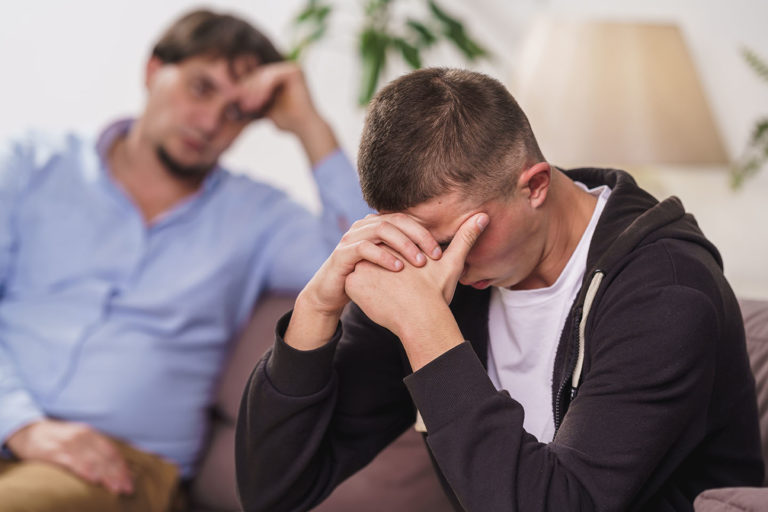Hallucinogens, sometimes referred to as psychedelics, are a group of substances that cause a profound alteration in a person’s perception of reality. In most cases, these types of substances are used for recreational use, with a desire to experience a heightened sense of awareness, an out-of-body experience or enhanced sensory perceptions.
Most people might first think of lysergic acid diethylamide (LSD) or “acid” when they hear the term “hallucinogens,” but in reality, there are two types of hallucinogenic drug categories. These include drugs like LSD, but also a category of substances, like phencyclidine (PCP), that cause dissociative effects. Both groups are considered to be hallucinogens. Read on to learn more about these substances and the dangers associated with them.
What substances are considered hallucinogens?
Hallucinogens are substances that can be derived from natural elements, such as certain types of mushrooms, plants or created synthetically in a lab. These types of hallucinogens include substances like LSD, psilocybin, PCP, ketamine, and mescaline.
These substances cause profound distortions in the person’s perceptions, including the way they process sensory stimuli. For those taking LSD, the experience is called a “trip.” You may either have a good trip or a bad trip.
The symptoms associated with hallucinogens vary depending on the substance. These might include:
- Altered perception of time
- Hallucinations
- Paranoia
- Euphoria
- Intensified emotions and response to sensory input
- Intense mood swings
- Detachment from reality
- Agitation
- Fear
- Violent behaviors
- Distorted perceptions of self and impaired judgment
- Flashbacks
- Rapid breathing
- Loss of coordination
- Nausea
- Dry mouth
- Increased heart rate
- Decreased appetite
- Disordered thoughts
Depending on which hallucinogenic substance is ingested, the effects may be fairly short-lived to lasting up to 15 hours.
Dangers of hallucinogens
Back in the 1960s, LSD came into public awareness when news reports emerged of individuals, under the influence of the drug, jumping off buildings thinking they could fly. While that might have indeed happened, most of the dangers of hallucinogens are not so dramatic. They are, however, quite unpredictable.
Some of the dangers associated with hallucinogens include:
- Violent acts committed due to a false perception of a given situation.
- May trigger psychosis in people who are predisposed to mental illness.
- Ongoing disturbing flashbacks can persist for weeks or months.
- May develop symptoms of depression.
- May develop psychological dependency to the substance.
- May experience cognitive impairment.
Long-term effects of hallucinogen use
While not all hallucinogens are addictive, long-term use of ketamine or PCP can result in addiction. Signs of addiction to these hallucinogens may include:
- Drug cravings.
- Compulsive drug-seeking behavior, such as obtaining the substance from an illicit source.
- Becoming isolated from friends and family.
- Attempting to stop taking the drug but not being able to.
- Negative consequences such as legal problems, accidental injuries or relationship problems due to the substance use.
- Continued use of the substance despite mounting consequences.
- Emergence of withdrawal symptoms.
Breaking free from hallucinogens
If the hallucinogen dependency is in its early stages, then an outpatient treatment program may be an appropriate option. Outpatient programs are sufficient for certain hallucinogen use disorders, such as LSD, peyote, and psilocybin. Outpatient services include individual psychotherapy, family therapy, process group therapy, 12 Step programs, education, relapse prevention planning and continuing care.
When experiencing substance use disorder involving PCP, ketamine, or party drugs like GHB or MDMA, a residential treatment program may be better suited. The residential setting is highly structured, with individualized treatment plans, case management and a more intensive implementation of the treatment elements listed above.
Whether you opt for outpatient or residential treatment, the ultimate goal of rehabilitation is to assist you in shaping a new life in recovery, free from all psychoactive substances.
Ashley Addiction Treatment, formerly Father Martin’s Ashley, is a nationally recognized nonprofit leader in integrated, evidence-based treatment for substance use disorders. Our programs are accredited by The Joint Commission, and result in frequent publications of ongoing research into effective treatment methodologies. We offer holistic care that encompasses the mind, body and spirit through inpatient and outpatient treatment, provide drug detox, relapse prevention plans, family wellness programs and a variety of other services tailored to each patient’s unique needs. Our driving principle — “everything for recovery” — reinforces our mission to transform and save lives through the science of medicine, the art of therapy and the compassion of spirituality, and is complemented by our philosophy of healing with respect and dignity. For information about our comprehensive programs, please call 866-313-6307




